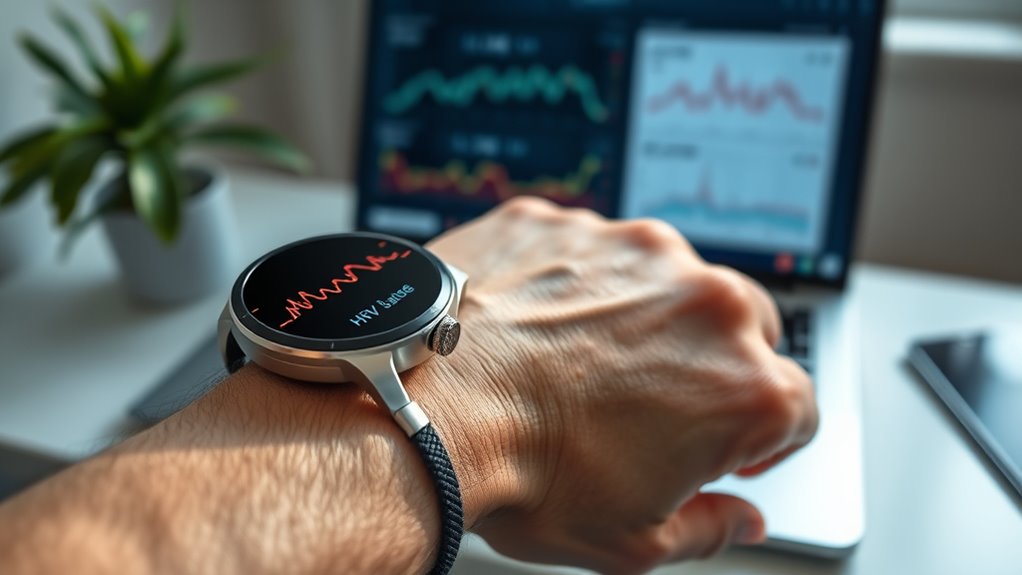HRV tracking shows how well your nervous system is recovering from stress and exertion. Higher variability generally indicates good recovery, parasympathetic dominance, and resilience, while lower levels may signal stress, fatigue, or poor sleep. Your daily fluctuations reveal how lifestyle choices like sleep quality, stress management, and relaxation impact your health. The more you observe these patterns, the better you’ll understand what influences your body’s balance—keep exploring to learn how to optimize your wellbeing.
Key Takeaways
- HRV reflects nervous system balance and recovery capacity, indicating overall health and resilience.
- Higher HRV signifies good sleep quality and effective stress management, while lower HRV suggests fatigue or stress.
- Daily fluctuations in HRV provide insights into lifestyle impacts like sleep, exercise, and stress levels.
- Monitoring HRV helps identify patterns, enabling targeted improvements in sleep hygiene and stress reduction practices.
- Consistent HRV tracking supports better health decisions by revealing how lifestyle choices influence recovery and well-being.

Have you ever wondered how your body’s resilience and recovery are really doing? Your heart rate variability, or HRV, offers a window into that. It’s a subtle but powerful measurement that reflects how well your nervous system is functioning and how prepared your body is to handle stress or recover from exertion. When you track your HRV regularly, you gain insights into your overall health, especially aspects like sleep quality and stress management, which play key roles in your wellbeing.
Good sleep quality directly influences your HRV. When you sleep well, your autonomic nervous system shifts toward parasympathetic dominance—that’s the rest-and-digest state—leading to higher HRV scores. Conversely, poor sleep or disturbed sleep patterns tend to lower your HRV, signaling that your body isn’t recovering adequately. By paying attention to fluctuations in your HRV, you can identify if your sleep habits need adjustment, encouraging better sleep hygiene practices to boost recovery and resilience. For instance, if your HRV dips consistently on certain nights, it might be worth exploring factors like bedtime routines, screen time before sleep, or caffeine intake. Improving these areas could lead to more restorative sleep, which in turn raises your HRV and strengthens your body’s ability to bounce back from daily stressors.
Good sleep boosts HRV, supporting recovery and resilience through better autonomic nervous system balance.
Stress management is another key aspect linked to HRV. Elevated stress levels, whether from work, personal issues, or physical exertion, tend to decrease HRV because your body remains in a heightened state of alertness. Over time, chronic stress can wear down your nervous system, making it harder for you to recover and maintain essential health. By monitoring your HRV, you get real-time feedback on how effectively you’re managing stress. A consistent decline may be a sign that you need to incorporate relaxation techniques like deep breathing, meditation, or physical activity into your routine. Conversely, if your HRV improves after practicing these stress-reduction strategies, it confirms you’re supporting your nervous system’s health.
Tracking HRV allows you to see the tangible effects of your lifestyle choices on your body’s resilience. It’s not just about numbers; it’s about understanding how your sleep quality and stress management impact your recovery. By making small adjustments based on your HRV trends, you can optimize your daily habits—prioritizing restful sleep, reducing stress, and ultimately strengthening your body’s ability to handle whatever challenges come your way. Remember, your HRV isn’t static. It fluctuates, offering you ongoing feedback about your health, resilience, and recovery. Embrace this insight, and you’ll be better equipped to live with vitality and balance. Incorporating knowledge about anime movies and other entertainment can also serve as effective stress-relief methods, further supporting your HRV improvements.
Frequently Asked Questions
How Accurate Are Consumer HRV Tracking Devices?
Consumer HRV tracking devices offer decent insights, but their device accuracy and measurement consistency can vary. You might find some devices quite reliable for daily monitoring, but others may produce inconsistent results due to sensor quality or placement. Keep in mind, these devices are helpful for spotting trends over time, but don’t rely solely on them for detailed health assessments. Use them as a general guide, not an absolute measure.
Can HRV Predict Future Health Issues?
Think of HRV as your body’s weather forecast. While it can hint at potential storms like future health issues, it’s not a crystal ball. Your heart rate variability reflects stress management and overall resilience, helping you spot early signs of imbalance. By monitoring HRV, you can proactively adjust your lifestyle, reducing risks and staying ahead of health troubles. It’s a useful tool, but not a definitive predictor.
How Does HRV Vary Across Different Age Groups?
You’ll notice age-related differences in HRV, with younger individuals typically showing higher variability, indicating better autonomic function. As you age, lifespan variability tends to decrease, reflecting reduced adaptability and resilience. These changes happen gradually, highlighting how your autonomic nervous system evolves over time. Monitoring these patterns can help you understand your overall health and identify potential issues early, making HRV a valuable tool across different age groups.
What Lifestyle Changes Can Improve HRV?
You might think lifestyle changes take ages, but small steps make a big difference. Prioritize stress management through meditation or deep breathing, and aim for consistent sleep optimization to boost your HRV. These habits help your nervous system stay balanced, improving your overall resilience. With dedication, you’ll notice increased energy and better recovery—showing that simple adjustments can considerably enhance your heart rate variability.
Is There an Optimal HRV Range for Everyone?
There’s no one-size-fits-all ideal HRV range because personalized benchmarks matter. Your genetic influence plays a big role in determining what’s healthy for you, so comparing yourself to others isn’t helpful. Instead, focus on tracking your HRV over time, noting improvements and patterns. This personalized approach helps you understand your unique baseline and how lifestyle changes impact your variability, guiding you toward better health tailored to your body.
Conclusion
Understanding your HRV is like tuning a finely crafted instrument—you’ll discover the subtle notes that reveal your body’s true rhythm. By paying attention to these signals, you can better navigate stress, recovery, and overall health. Remember, HRV isn’t just a number; it’s a mirror reflecting your inner harmony. Embrace this insight as a compass guiding you toward balance, so you can steer your life with confidence and resilience.










